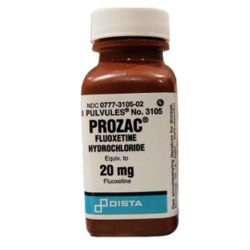We looked into Fluoxetine on the basis of its ingredients, customer reviews, and more. Does Fluoxetine really work? Read Fluoxetine review here!
Overview
Fluoxetine is a widely used medication that belongs to the class of selective serotonin reuptake inhibitors (SSRIs). It is commonly prescribed for the treatment of depression, anxiety disorders, obsessive-compulsive disorder (OCD), and other mental health conditions.

Fluoxetine
What is Fluoxetine?
Fluoxetine, also known by its brand name Prozac, is a medication that helps balance the levels of serotonin, a neurotransmitter in the brain. Serotonin is associated with mood regulation, and by increasing its availability, fluoxetine helps alleviate symptoms of depression and anxiety.
How does Fluoxetine work?
Fluoxetine works by selectively inhibiting the reuptake of serotonin in the brain. By blocking the reabsorption of serotonin into the nerve cells, it increases the concentration of serotonin in the brain, which can improve mood, reduce anxiety, and alleviate other symptoms of mental health disorders.
Ingredients
- Fluoxetine hydrochloride: Fluoxetine hydrochloride is the active ingredient in fluoxetine. It is a selective serotonin reuptake inhibitor (SSRI) that helps balance the levels of serotonin in the brain.study
- Microcrystalline cellulose: Microcrystalline cellulose is a commonly used excipient in pharmaceutical formulations. It serves as a binder, diluent, and disintegrant in the production of fluoxetine tablets or capsules.study
- Talc: Talc is a mineral substance used as an excipient in pharmaceutical products. It helps improve the flowability and lubricity of the fluoxetine formulation during manufacturing.study
- Magnesium stearate: Magnesium stearate is a magnesium salt of stearic acid. It is used as a lubricant in the production of fluoxetine tablets or capsules to prevent sticking to the manufacturing equipment and facilitate tablet formation.study
The combination of fluoxetine hydrochloride, microcrystalline cellulose, talc, and magnesium stearate works together to create the final formulation of fluoxetine. These ingredients ensure the proper delivery, stability, and effectiveness of the medication when administered.
Pros and Cons of Fluoxetine
Pros
- Effectively treats depression and anxiety disorders
- Helps manage symptoms of OCD
- Can improve mood and overall well-being
- Has a long history of safe and effective use
Cons
- May cause side effects such as nausea, insomnia, or sexual dysfunction
- Requires regular usage to maintain therapeutic effects
- Not suitable for everyone, as individual responses may vary
- Should not be abruptly discontinued without medical supervision
FAQ’s
Q: What are the possible side effects of Fluoxetine?
A: Common side effects of fluoxetine may include nausea, headache, insomnia, drowsiness, and sexual dysfunction. However, it’s important to consult with a healthcare professional for a complete list of potential side effects and to discuss any concerns.
Q: How long does it take for Fluoxetine to start working?
A: The onset of fluoxetine’s effects can vary among individuals. It may take several weeks of regular use to experience the full therapeutic benefits. It’s crucial to follow the prescribed dosage and consult with a healthcare professional for guidance.
Q: Can Fluoxetine be used during pregnancy?
A: The use of fluoxetine during pregnancy should be discussed with a healthcare professional. While studies have not shown conclusive evidence of harm to the fetus, the potential risks and benefits need to be carefully evaluated for each individual case.
Q: Is Fluoxetine addictive?
A: No, fluoxetine is not considered addictive. It does not induce cravings or compulsive drug-seeking behaviors. However, abrupt discontinuation of fluoxetine without medical guidance may lead to discontinuation symptoms. It’s important to follow the recommended tapering schedule when stopping the medication.
Conclusion
Fluoxetine is a widely prescribed medication that effectively treats depression, anxiety disorders, and OCD. By increasing the availability of serotonin in the brain, it helps regulate mood and alleviate symptoms associated with these conditions. While it has pros such as its efficacy and established safety record, it’s important to be aware of potential side effects and individual responses. Consulting with a healthcare professional is crucial to determine the appropriate usage and to address any concerns. Overall, fluoxetine can be a valuable tool in managing mental health conditions when used under medical supervision.
Below you’ll find some of the most effective Depression formulations on the market today, in our opinion
Our Top Depression Choices*
ConsumerReviews.tv is dedicated to bringing you the best products with the most effective ingredients. Our unique Review Ranking Platform combines our personal experience with online reviews and opinions from over 100 independent review websites.
**This is a subjective assessment based on the strength of the available informations and our estimation of efficacy.
*Result may vary. The information contained in this website is provided for general informational purpose. No medical claims are implied in this content, and the information herein is not intended to be used for self diagnosis or self treatment of any condition.
*Disclosure of Material connection: Some of the links in the post above are “associate sales links.” This means if you can click on the link and purchase an item, we will receive a commission. Regardless, we only recommend products or services which we use personally and/or believe will add value to our readers. We are disclosing this in accordance with the Federal Trade Commission's 16 CFR, Part 255: “Guides Concerning the Use of Endorsements and Testimonials.”










Robert D.